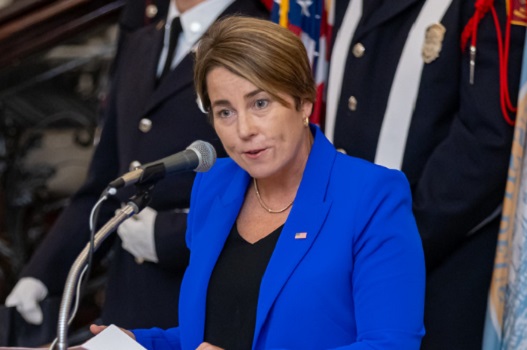latest
Massachusetts Governor Healey gets, signs overdue $3.1 billion closeout budget, here is what’s in it

Chris Lisinski
DEC. 4, 2023…..After weeks of legislative procrastination, parliamentary delays and finger-pointing, a $3.1 billion spending bill packed with money for the stretched-thin emergency shelter system and public worker raises landed on Gov. Maura Healey’s desk Monday and she immediately signed it.
House Democrats were able to get a quorum of members together to push through a compromise on a long-overdue package they failed to wrap up before the Legislature shifted into a seven-week holiday stretch of informal sessions.
Republicans in the House successfully stalled the bill on Thursday, Friday and Saturday by pointing out that not enough lawmakers were present to constitute a quorum, but enough Democrats ventured to the State House on Monday to get the bill through that branch.
The House adopted the compromise bill on a hand-counted 105-14 vote, and the Senate followed through several hours later with a 20-3 vote. Both branches then gave the measure final approval on unrecorded voice votes, sending it to Healey.
The bill includes critical funds to fulfill state employee raises, which had already been collectively bargained and ratified, as well as $250 million to try and keep pace with unprecedented demand on the emergency shelter system.
“I’m proud to sign this supplemental budget that dedicates critical funding for hard-earned raises for workers, supports municipalities with covering the costs of special education and flood relief, sustains our Emergency Assistance program, and more. I’m grateful to our colleagues in the Legislature for their partnership,” Healey said in a statement.
The bill also schedules the next statewide primary for Sept. 3, 2024, directs money to school districts facing increased special education costs, transfers money to address the state’s unfunded pension liability, and more.
Language to facilitate a New England Revolution stadium in Everett was dropped from the final compromise, but top Democrats in the House and Senate say the idea, which has won favor in both branches at different points, remains under consideration.
Stuttered progress on the bill in recent weeks set off a whirlwind of finger-pointing. Despite a light fall agenda, Democrats failed to agree among themselves on the bill before formal sessions for the year ended Nov. 15, opening the door for Republicans who disliked the bill’s approach to shelter crisis management.
Senate Republicans could have tried to delay the bill on Monday, but agreed to let it proceed while recording their opposition.
“We could have gone down that road,” said Republican Sen. Peter Durant of Spencer, the chamber’s newest member who on the campaign trail was a vocal critic of the state’s emergency shelter management. But Democrats could have used parliamentary tactics of their own in response, he said, and ultimately pushed the bill through on an unrecorded voice vote.
“This was a better option to us that you could be at least heard, at least semi-recorded,” Durant said after the session.
The bill’s signing will allow the state comptroller to start closing the financial books for the fiscal year that ended June 30.
Senate Ways and Means Committee Chair Michael Rodrigues, his chamber’s lead negotiator on the measure, told his colleagues that Monday’s action could put worker raises in effect for the holiday season — and he blamed the House for preventing retroactive pay from taking effect before the new year.
“I’ve been told in my conversations with the administration that if we complete the work today and get this budget to the governor, those employees will be able to see their raises in the paychecks that come out on Dec. 22, before the Christmas holiday,” Rodrigues said in a speech from the Senate floor. “Wouldn’t that be a great thing? Unfortunately, because of the delay down the hall, they will not be able to receive the retroactive pay that they will be entitled to. That will come in early January.”
The governor kicked off debate by filing her own closeout budget on Sept. 13 with a request to steer $250 million more into the evolving emergency shelter crisis fueled in part by a massive increase in migrants arriving in Massachusetts.
House Democrats did not advance their own version for nearly two months, and the two branches were unable to reconcile differences in their approaches as formal sessions for the year drew to a close.
Republicans in that chamber prevented the late-arriving compromise from advancing on three successive days last week, prompting House Speaker Ron Mariano to contend they were obstructing the measure because “they want to seem to be relevant.”
GOP leaders have opposed the latest infusion of funding into the emergency shelter system, which brings the total amount for FY24 up to about $575 million. Democrats have said they expect the additional money to last into the spring, but not the entirety of the fiscal year.
“We all know the funding in this bill is just the tip of the iceberg which will ultimately crowd out spending in other areas absent serious and meaningful reforms,” said House Minority Leader Brad Jones.
“The Democrats are trying to promote a false narrative laying the blame on our caucus for holding up final action on the closeout budget for the last few days,” he said in a statement on behalf of his caucus. “The reality is the Democrats delayed action on this bill for nearly two months, failed to reach an agreement before formal sessions ended on November 15, and did not produce a conference committee report until November 30, exactly eleven weeks after Governor Healey first filed the bill.”
Lawmakers once sought to close the state’s financial books in the late summer or fall, but in recent years, the Democrat supermajorities have worked at a glacial pace. The fiscal 2023 closeout budget becomes the second-latest to win enactment since the turn of the century, according to data tracked by the Massachusetts Taxpayers Foundation, lagging only fiscal year 2019, which the Legislature approved on Dec. 12, 2019.
Republicans pushed unsuccessfully for the Legislature to reconvene a formal session, where the final compromise bill could receive a roll call vote and debate. Legislative rules call for informal-only sessions for the final seven weeks in the first year of the session.
The Senate adopted a GOP-backed order that would allow a rare holiday-season formal session to consider the closeout budget, but the House never took action on the proposal, preventing it from having any effect.
“We wanted to make sure the public was aware of what was going on and we were taking a stand to say, ‘You can’t operate this way,'” said Republican Sen. Ryan Fattman of Sutton.
[Sam Doran contributed reporting.]
-

 Community6 years ago
Community6 years agoNational Shrine of La Salette Festival of Lights 2017 set to begin
-

 Community6 years ago
Community6 years agoMassachusetts State Police looking for good home for retired dogs
-

 Crime6 years ago
Crime6 years agoFall River ranked most dangerous city in Massachusetts according to report
-

 latest6 years ago
latest6 years agoDurfee student allegedly overdoses on marijuana
-

 Community6 years ago
Community6 years agoVideo of Fall River Police goes viral
-

 Causes6 years ago
Causes6 years agoMissing Fall River woman found deceased
-

 Crime6 years ago
Crime6 years agoFall River Police add names to most wanted list
-

 Causes6 years ago
Causes6 years agoFall River teenager reported missing has been found






JoeBamasCrackHouse
December 6, 2023 at 7:54 am
125 people authorized the spending of $3.1 Billion in taxpayer money with 3 weeks left in the year. No problems here, just move it along.
Klaus Schwab
December 6, 2023 at 11:39 pm
https://fallriverreporter.com/massachusetts-tax-collections-not-keeping-pace-as-state-spending-soars/